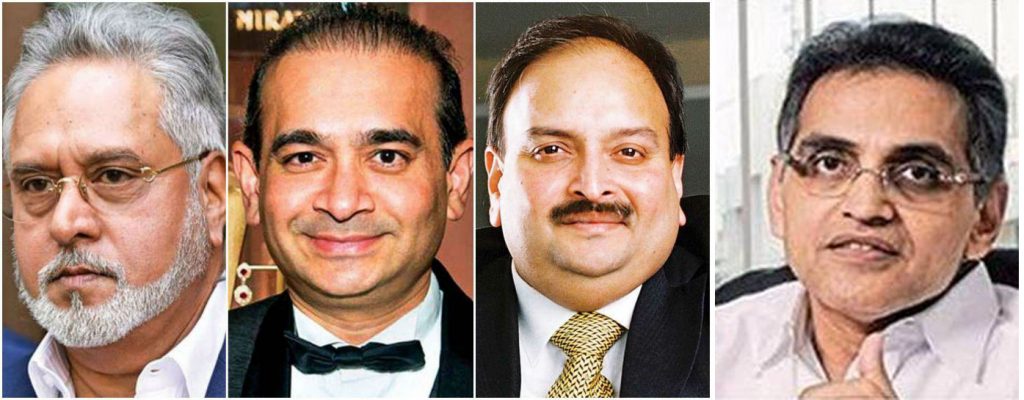New Delhi, April 10: Government sources have indicated that they are pursuing four quarries – Vijay Mallya, Nirav Modi, Mehul Choksi and Jatin Mehta – all economic offenders and fugitives from the law relentlessly.
In each case, a carefully calibrated strategy is in place to bring the culprits to book, and more importantly, home. A major breakthrough is expected shortly, in the middle of the elections.
While Neerav Modi and Mallya are ensconced in Britain and the local criminal justice system is in their pursuit, the Indian government is trying all the necessary tactics to bring both diamantaires Choksi and Mehta back from the Caribbean islands.
Government-to government negotiations are on with Antigua and Barbuda for Choksi and St Kitts and Nevis for Winsome Diamonds’ Mehta. Availing of the controversial paid citizenship programme provided by many of the islands in the Caribbean, diamantaire Mehul Choksi and Winsome Diamonds’ promoter Jatin Mehta have taken citizenship in these parts.
Mehta became a citizen of St Kitts and Nevis some years ago while Choksi took Antigua and Barbuda citizenship recently. These islands provide visa-free travel to 132 countries.
Citizenship through investment has become popular among Indian economic offenders. Investigating agency sources also revealed that Choksi and Mehta are the principal targets of this exercise.
The government-to-government communication revolves around securing both targets through extradition, which is difficult because there are no extradition treaties with these countries. Mehul Choksi may be picked up in the Caribbean, while Nirav Modi who remains under arrest in London are most wanted. The lack of extradition treaties has made these islands a safe haven for India’s uber rich. Other countries like Grenada, St Lucia, Dominica also have similar citizenship by investment programmes. India has appealed to these small islands with a pitch that they are economic offenders and fugitives for committing financial crimes.
Dominica and St Lucia give citizenship and a valid passport for just $100,000 which is chump change for ultra rich Indians on the run. If your spouse needs a similar passport then it is $165,000 in St Lucia and $175,000 in Dominica. Meanwhile, Grenada gives a similar passport for $200,000.
Predicated on its nine-point agenda presented in the G-20 Leaders’ Summit held on November 30, 2018 and December 1, 2018 in Buenos Aires, Argentina, for action against fugitive economic offenders, Indian diplomats in conjunction with Interpol and domestic probe agencies are determined to bring all four back.
India has pursued the agenda against fugitive economic offenders in various forums of the G20, like, Finance and Sherpa Tracks, Anti-Corruption Working Group and the Denial of Entry Experts Network. Consequently, Leaders’ Declaration, adopted at the G20 Buenos Aires Summit, inter alia, says: “We will further explore the links between corruption and other economic crimes and ways to tackle them, including through cooperation on the return of persons sought for such offences and stolen assets, consistent with international obligations and domestic legal systems. We ask relevant international organizations to report back to us on those issues during the next presidency.” This reflects the will exhibited by the G20 members to tackle the issue of return of persons sought for economic offences and stolen assets through international cooperation. This came after the government got the Fugitive Economic Offenders Bill in July 2018 by both Houses of Parliament.
The Bill allows for a person to be declared as a fugitive economic offender (FEO) if: (i) an arrest warrant has been issued against him for any specified offences where the value involved is over Rs 100 crore, and (ii) he has left the country and refuses to return to face prosecution.
To declare a person an FEO, an application will be filed in a Special Court (designated under the Prevention of Money-Laundering Act, 2002) containing details of the properties to be confiscated, and any information about the person’s whereabouts.
The Special Court will require the person to appear at a specified place at least six weeks from issue of notice. Proceedings will be terminated if the person appears.
The Bill allows authorities to provisionally attach properties of an accused, while the application is pending before the Special Court.
Upon declaration as an FEO, properties of a person may be confiscated and vested in the Central government, free of encumbrances (rights and claims in the property).
Further, the FEO or any company associated with him may be barred from filing or defending civil claims.
The nine-point Agenda for Economic Offenders presented in Buenos Aires: * Strong and active cooperation across G-20 countries to deal comprehensively and efficiently with the menace fugitive economic offenders.
* Cooperation in the legal processes such as effective freezing of the proceeds of crime; early return of the offenders and efficient repatriation of the proceeds of crime should be enhanced and streamlined.
* Joint effort by G-20 countries to form a mechanism that denies entry and safe havens to all fugitive economic offenders.
* Principles of United Nations Convention Against Corruption (UNCAC), United Nations Convention Against Transnational Organized Crime (UNOTC), especially related to “International Cooperation” should be fully and effectively implemented.
* FATF should be called upon to assign priority and focus to establishing international co-operation that leads to timely and comprehensive exchange of information between the competent authorities and FIUs.
* FATF should be tasked to formulate a standard definition of fugitive economic offenders.
* FATF should also develop a set of commonly agreed and standardized procedures related to identification, extradition and judicial proceedings for dealing with fugitive economic offenders to provide guidance and assistance to G-20 countries, subject to their domestic law.
* Common platform should be set up for sharing experiences and best practices including successful cases of extradition, gaps in existing systems of extradition and legal assistance.
* G-20 Forum should consider initiating work on locating properties of economic offenders who have a tax debt in the country of their residence for its recovery.
